Pic: Battle busespublished at 12:23
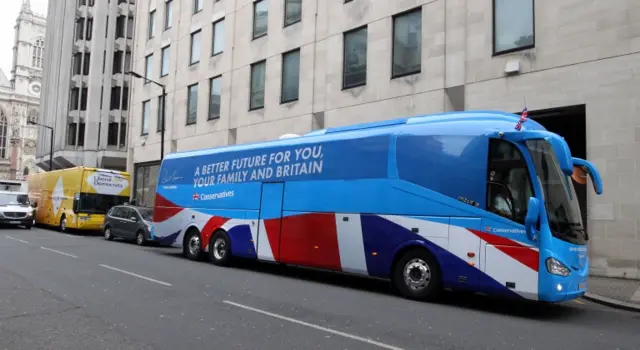 Image source, Press Association
Image source, Press AssociationThe general election campaign is officially under way
Parliament has dissolved and MPs have officially reverted to being members of the public
David Cameron urged voters to keep him in power to finish the job of turning the economy around
Ed Miliband launched his party's business manifesto and warns of the risks of an EU referendum
Nick Clegg would not say if his party would block an EU referendum if it entered another coalition with the Tories
There are 38 days until the general election
Angela Harrison, Marie Jackson, Catherine McGowan and Tom Moseley
 Image source, Press Association
Image source, Press AssociationNick Clegg just walked into the palace and moments later the PM came back out again. Wonder if they exchanged a word or two as they passed in the corridor...
Outside of the main political parties, other campaign launches are happening this week. Left Unity, a broad left party formed in 2013, said it had chosen a Soho squat as its venue to highlight the number of large buildings sitting empty in London. Film director Ken Loach, who co-founded the party, will attend the launch tomorrow. Left Unity is planning to stand candidates in around 10 constituencies, mainly where Labour has a big majority.
Here’s a bit more from Nick Clegg, who gave a press conference outside No 10 a short time ago.
Quote Message"It is my view that the era of single-party government is now over in British politics. About the very last thing the country now needs is a lurch to the left or the right and yet that is exactly what the Conservative and Labour parties are now threatening.”
Nick Clegg, Deputy Prime Minister
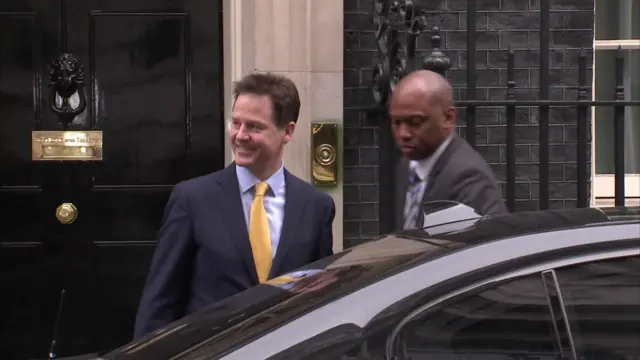
“We don’t always do what our donors say,” says Ed Miliband, continuing his Q&A in the City. The audience laugh as he says that is what makes his party different from the Conservatives. He was asked a question about Assem Allam, who is one of the party’s biggest donors but disagrees with some of Mr Miliband’s views on business. Mr Miliband insists Labour is taking a “pro-business approach”.
A rather windswept David Cameron leaving Downing Street a short time ago. We expect him to spend roughly 20 minutes with the Queen.
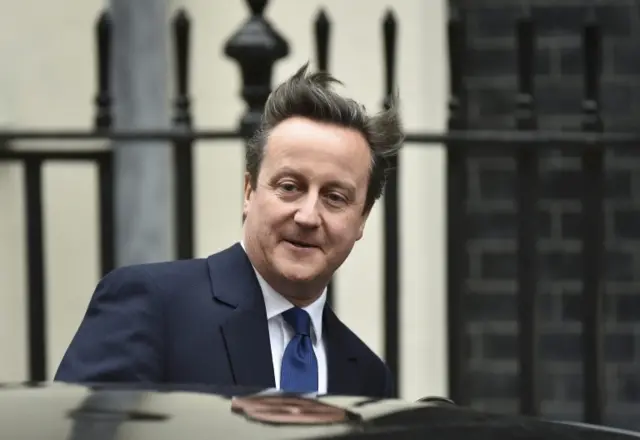 Image source, Reuters
Image source, ReutersDavid Cameron leaves Downing Street on his journey to Buckingham Palace.
Deputy Prime Minister Nick Clegg, on his way to see the Queen, tells reporters: "This has been a historic government." It was formed during an economic emergency "by two parties acting in the national interest", he claims. The Lib Dem leader argues that "the last thing the country now needs is a lurch to the left or the right" under Labour or the Conservatives, and reckons his party will do "massively better than some of the low expectations that have been set for us".
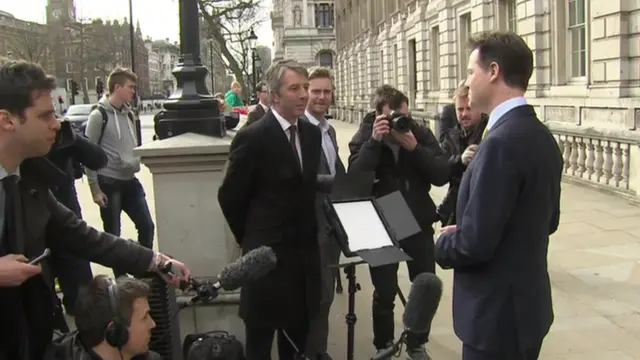
Ed Miliband says that the Conservatives would mean a UK "inside the European Union banging on the door to leave or, even worse, outside the European Union banging on the door to be let back in". The run up to a referendum, which the Tories have promised in 2017, means "two years of uncertainty", Mr Miliband argues. The UK "must be a committed member of a reformed European Union" instead.
Any firm that gets a government contract "must provide apprenticeships for the next generation", Ed Miliband says.“We will start a revolution in vocational educational,” he promises.
"Britain can only succeed when all businesses have the chance to succeed," Ed Miliband says. This includes "the multinational company and the family firm". In his election campaign speech at Bloomberg in London, the Labour leader says his party will balance the books, invest in infrastructure and "won't risk jobs, exports and investment" or cause "years of uncertainty by threatening to leave the European Union".
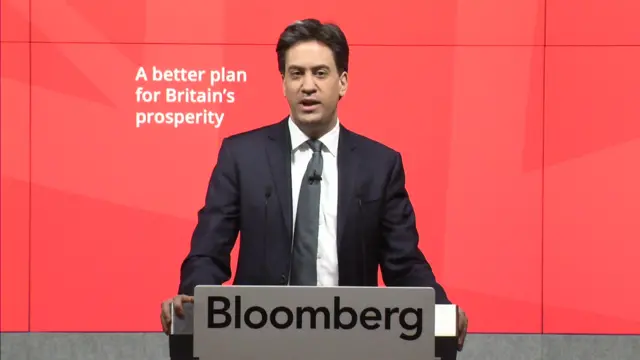
Robin Brant, BBC Political Correspondent
UKIP has long faced the accusation that it is simply a one-man band. A Farage cult. It's something he and the party have repeatedly dismissed. But this election is all about Nigel. UKIP's number one priority is to get him elected to Parliament. This is his sixth and almost certainly last attempt. If he doesn't win in South Thanet he's said he'll resign as leader, leaving UKIP minus its biggest asset. UKIP has branched out with a raft of new policies but immigration remains at the core. A demand for a referendum on leaving the EU is top of its wish list. UKIP is targeting around 20 seats. The very least it has to do to have a good night on 7 May is hold Clacton and Rochester and get Farage elected in Kent. Two things are certain in the coming weeks: there will be organised anti-UKIP protests on the campaign trail and elements of racism (isolated elements, the party says) will emerge from within it, again.
BBC correspondent Jonny Dymond
The Conservative challenge is not a simple one. A political strategy that revolves around beating a simple message - "We've got a plan, Labour will ruin it" - into voters' heads for six long weeks already feels thin. A nervy interview last week and some patchy polls will not have boosted the morale of party campaigners. The party needs to lever seats out of the hands of Labour in English constituencies, and to take Liberal Democrat strongholds; that needs to be done from the political centre. At the same time it needs to push back a challenge from the right, in the form of UKIP, without alienating latte-loving metropolitan sophisticates or pragmatic business backers.
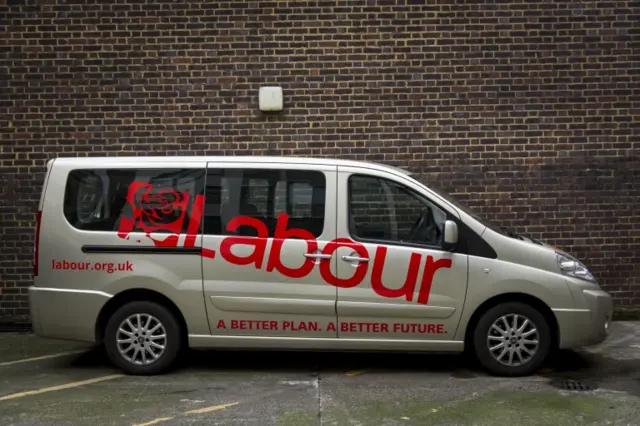 Image source, Getty
Image source, GettyYou've seen the pink bus, now there's this. Apparently it's gold, according to Getty who took the picture.
 Reality Check
Reality Check
The Reality Check team is having a think about the figure tweeted by the Conservative Party press office this morning, that “@Ed_Miliband, externalwill also raise taxes on every working family in Britain by £3,000”. Labour says this figure is “totally made up” and the Conservatives say they won’t show us their workings until the prime minister has spoken. Just looking at what the figures would mean though, according to theOffice for National Statistics, externalthere are 11.6 million working households in the UK. If you exclude Northern Ireland to get a figure for working families in Britain you get to about 11.2 million. If each of them will be paying an extra £3,000, they will raise about 33.6bn. So, we’re waiting for details from the Tories of why Labour needs to raise an extra £33.6bn in taxes.
Another contender for most cheerful politician of the day. Nigel Farage brandishing UKIP's pledge card earlier.
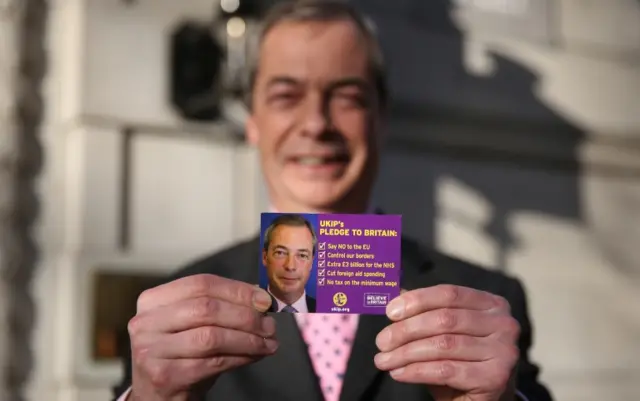 Image source, Getty
Image source, Getty BBC News Channel
BBC News Channel
The Parliament that has just been dissolved was fixed at five years under the Fixed-term Parliaments Act 2011. Before that, prime ministers had the power to call an election at an earlier time if they chose to. Prof Vernon Bogdanor tells the BBC that the act came about because the Lib Dems wanted "a kind of fixed-term contract" for their coalition deal with the Conservatives. "It's very controversial," he adds. "It could be repealed in the next Parliament."